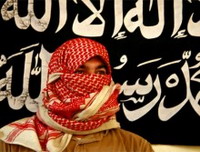Lebanese army resumes bombarding of suspected hideouts of al-Qaida-inspired militants
The new round of clashes came a day after some of the heaviest fighting since June 1, when the Lebanese army -using tanks and artillery - launched a fresh offensive to drive out the Fatah Islam militants.

A senior military official said the number of soldiers killed in Saturday's fighting had risen to 11. The official, speaking on condition of anonymity because he was not allowed to give official statements, said 40 others were wounded, some seriously.
It was the highest casualty toll in a single day since fighting began May 20 -the worst internal violence to engulf Lebanon since the 1975-90 civil war -reflecting the tough challenge Lebanese troops face in efforts to crush Fatah Islam militants barricaded inside the camp.
Another soldier, wounded earlier at the camp, had died of his wounds Saturday, bringing to 58 the total number of soldiers killed in the fighting.
Thick black and white smoke billowed from the Nahr el-Bared camp on the outskirts of the northern city of Tripoli by late afternoon Sunday, as troops unleashed artillery fire on suspected Fatah Islam hideouts, security officials and witnesses said.
An AP photographer, standing at the camp's northern entrance, saw about 10 military and civilian ambulances racing from inside the camp toward nearby hospitals. It was not immediately known if the casualties the ambulances ferried were soldiers, civilians or militants.
During the relative lull Sunday, the Lebanese Red Cross along with the Palestinian Red Crescent Society evacuated some 75 civilians, mainly women, children and elderly, from Nahr el-Bared, taking them to the nearby Beddawi refugee camp, a Lebanese Red Cross official told The Associated Press.
The aid workers also pulled out two bodies from under the rubble, the official said, speaking on condition of anonymity because he was not authorized to make public statements.
It was not clear if the bodies belonged to Palestinian civilians from the camp or Fatah Islam militants. Although most of Nahr el-Bared's residents have fled, thousands of civilians remain inside.
The state-run National News Agency said the army was making advances and that its bombardment was targeting Fatah Islam's main stronghold in the camp and the location of the group's leaders, in efforts to uproot the militants.
On Sunday, the army reopened the main road linking Tripoli with the province of Akkar and the Syrian border, which was closed Saturday.
Later Sunday at Tripoli's main municipal stadium, thousands rallied in support of the army's battle against Fatah Islam. Pictures of fallen soldiers were put up and rival politicians and legislators from pro-government and opposition groups attended. Speakers praised the army's "heroism and sacrifices in confronting terrorism."
According to an army statement Saturday, the military had taken control of several buildings in the camp while "continuing to tighten the grip on the gunmen in order to force them to abandon their weapons and surrender."
But a senior Fatah Islam commander denied the army was making advances and said fighters were holding their ground against the soldiers and fighting with the same tenacity.
Abu Hureira, a Lebanese whose real name is Shehab al-Qaddour, dismissed on Saturday as rumors some media reports that he or Fatah Islam leader Shaker Youssef al-Absi had been wounded. He said some fighters were only lightly injured.
A Lebanese Sunni Muslim cleric from Tripoli who acted as a mediator between the army and the militants, said Sunday that his efforts have reached a dead end and that the "final decision" was now in the hands of the al-Qaida terror network.
"It seems the Fatah Islam issue ... is now being handled by the international al-Qaida organization," said cleric Fathi Yakan, in an indication that Fatah Islam was looking to al-Qaida for instructions.
Tensions in Lebanon have been high since fighting broke out May 20 between the army and Fatah Islam militants in Nahr el-Bared. Fears of spreading chaos have also been sparked by clashes at another Palestinian refugee camp, Ein el-Hilweh in the south, and several bombings in the Beirut area.
More than 130 people, including at least 60 Fatah Islam militants, 58 soldiers and 20 civilians, have been reported killed in the fighting.
Subscribe to Pravda.Ru Telegram channel, Facebook, RSS!





